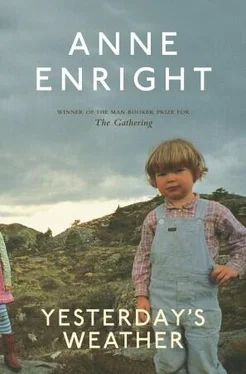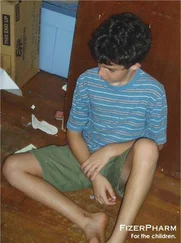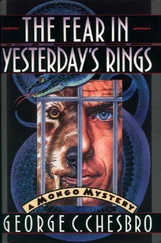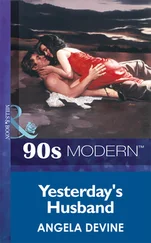‘The corpse was on the bed, newly dead, but rotting all the same. The sheets hadn’t been changed for a year so you couldn’t tell what colour they should have been. She had … lost control of her functions but they just left her to it, so her skin was the same shade as the sheets. Maureen cut layers and layers of skirts and tights and muck off her and when she got to the feet, she nearly cried. Her nails had grown so long without cutting, they had curled in under the soles and left scars.
‘“Those Gorman women,” said my father, with relish. “So which of them came first, the chicken or her egg?” and he laughed at me like a dirty old codger on the side of the road.’
After he left the house, the sun was so strong, it seemed to kill all sound. He met her daughter on the road and tackled her for the football, then kicked it slowly into the ditch.
‘When I lost my virginity, everything was the same, and everything was changed. I stopped reading poetry, for one thing. It wasn’t that it was telling lies — it just seemed to be talking to someone else.
‘Now I can’t stop screwing around. What can I say? I hate it, but it still doesn’t seem to matter. I keep my life in order. My dry-cleaning bill is huge. I have money.
‘My father knew one woman all his life. He dressed like a tramp. Seriously. What could he know? He knew about dignity and the weather and words. It was all so easy. I hate him for landing me in it like this — with no proper question and six answers to something else.’
The cinema projectionist in Frank’s home town was often drunk. When he was thrown out by his wife he slept the night in the projection booth and ate the stale Mars Bars and crisps from the counter in the foyer. He threw up once over a roll of film and had to spend the day cleaning and untangling it. Frank’s first experience of ‘The Dam Busters’ was splattered with small, mucky explosions and the sound-track was a mess.
Even so, everyone went to the pictures, and the boys at the front shouted at the couples snogging in the back row. Frank was not enchanted by the plush red seats, nor by their sexual possibilities, though their smell still sometimes hit him unawares. He felt nothing but the dread of the picture to come, the size of it on the screen, the colours, and the way that it jerked from place to place. The projectionist sometimes put the reels on in the wrong order and the beginning of the picture came halfway through. Most exciting of all was the time that the drunken projectionist fell asleep, and the film, passing close to the bulb, had gone on fire. This was the terror that provoked Frank into a job in television.
The air in the editing room had been around the building four times. It seemed to settle there and go cold. Frank sits in a hardback chair in front of the console and a producer sits at his back. What the producer does is his own business. Some of them click their fingers at a cut, or catch their breath or say ‘There!’ Some of them make faces behind his back, field phone-calls, pace up and down the room. Some of them go away. In front of them are three monitors, and Frank sits all day and staples the picture from one monitor onto the picture of another, without any seams showing. He is the magic of television.
Frank doesn’t work on celluloid, he works with tapes that slot in and happen in the machines like they were happening in his head. He can mix or fade, he can freeze the picture at any selected moment, at a laugh, or a fumble. He can make figures move slowly, as if they are pushing their way through honey, or scatter them along the street like Charlie Chaplin. The moment is as long as he likes. Ninety seconds of a finished programme can cover a minute or three years. He is a master of time. No wonder then, that he likes the job.
At three o’clock in the morning the urge to subvert got very strong. He could feed in the word ‘FRAUD’ behind Charlie Haughey, for a micro-second that would hit the heart of the nation. He could put a dog whistle on the other track, so that all the dogs in the country would bark at the same time. He could slow down an interview the fraction it took to make someone slur like a drunk. Of course he resisted this need, because he was responsible, and part of the broadcasting machine. (Frank’s sister beat him up when he was five, for drawing over the walls with her lipstick, and the pain ticked at the edge of his mind when he was very tired, and subversion was at his fingertips.)
Frank sometimes wondered where it all went, the stuff he threw away; smiles, swear-words, faces that slid out of focus. There is a parallel universe, he thought, in ‘Star Trek’, made up of all the out-takes; the fluffs, blunders and bad (worse) acting that never made it to the final cut. A world where Captain Kirk says ‘shit’ and Spock’s ears become detached. Perhaps the story is better over there. He thought of a universe made up of all the different silences that are nipped, tucked and disposed of. The silence of a hospital at night, the silence when a woman forgets what to say, the silence of a politician. They have to go somewhere. It is a terrible crime, Frank thought, to throw away a silence.
It was the sheer waste that depressed him; the waste of a movement. The woman in the interview raises her arm to smooth an eyebrow and the editor throws away a feast of under-arm hair. He had that gesture, there in his hand, and he threw it away.
When the signal is beamed all the way to Alpha Centauri, the aliens will never see a hairy woman. They will wait for centuries for that one signal, the one they expect and recognise as a call to come and save the world. Who is to say otherwise? Beautiful hairy aliens who never throw anything away except what is deliberately made. Spontaneous Aliens who talk in semaphore and discover everything by accident, in the dustbins of science — which is why they are so advanced.
Frank was dreaming of aliens. He was dreaming of better pay and probably of under-arms. He was dreaming about someone’s laugh that he threw out that day. He was dreaming of the split-second where a man wavered and Frank cut him dead.
Over his monitors, Frank had pasted a sign ‘The mills of the gods grind slowly, but they grind exceedingly small.’
Soon after he started the job, Frank began to pick up the pictures on the side of the road and string them together in his head. His car stops at the lights beside some road-workers. They talk over the pneumatic drill in glances and a toss of the head. The age of the men is surprising, they have pot bellies and cement dust has settled in the creases of their clothes. Everything is coated with the road; there is cement caked under their fingernails, and their boots are encrusted with tar — in three weeks’ time they will be altogether solid. Frank turns the dust, the wheelbarrow full of flaming tar, the traffic cones, and the way the drill turns everything mute, into a beer commercial, where the world is tinted blue. He catches the looks between the men to the rhythm of the song ‘Heart of Stone’. It is a good piece, but short. Someone changes the station on a remote control as the traffic lights go green.
It got worse. Frank dreamt of the slice of time between shots, so thin, it couldn’t be said to exist at all. He edits and re-edits the film of his father in his sleep. The story of his father is a loose montage that also involves clay and calloused hands, a boot on the side of a spade, a figure moving over the brow of a hill. Sometimes the music is sentimental, sometimes unsettling. Most often he uses the sound of a distant wireless where a quiz show is being played out, and the sound gets closer when his father walks into the room.
The Sunday dinner table is composed of glances from one child to another, and warning looks from his mother. The camera goes under the table, where one small foot in a long grey schoolboy sock kicks out at another. He sees his father’s mouth chewing, he sees his knife and fork cutting the meat with delicate violence. The sound-track is silent, except for the scrape of cutlery.
Читать дальше












